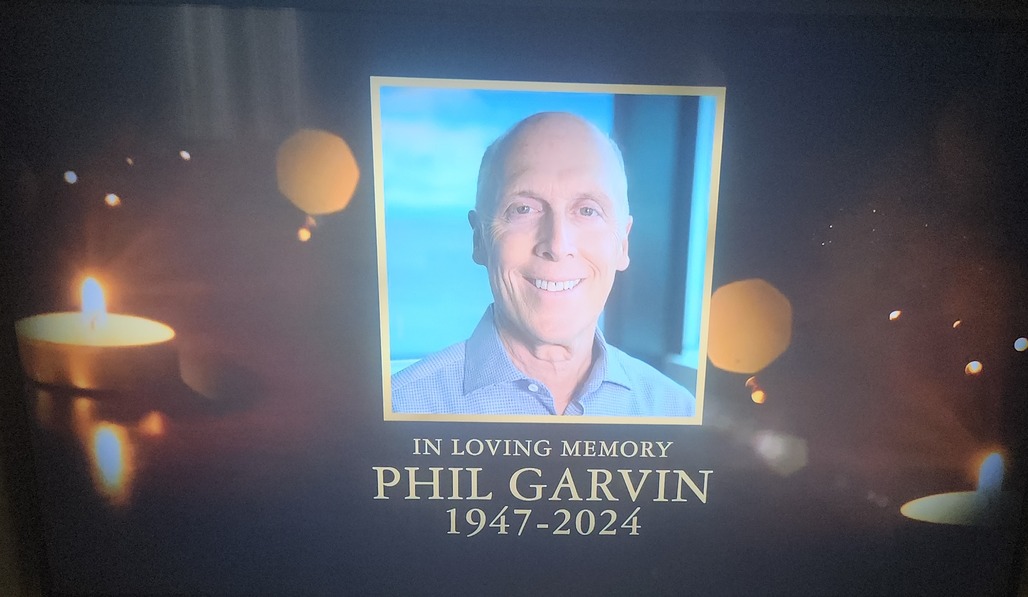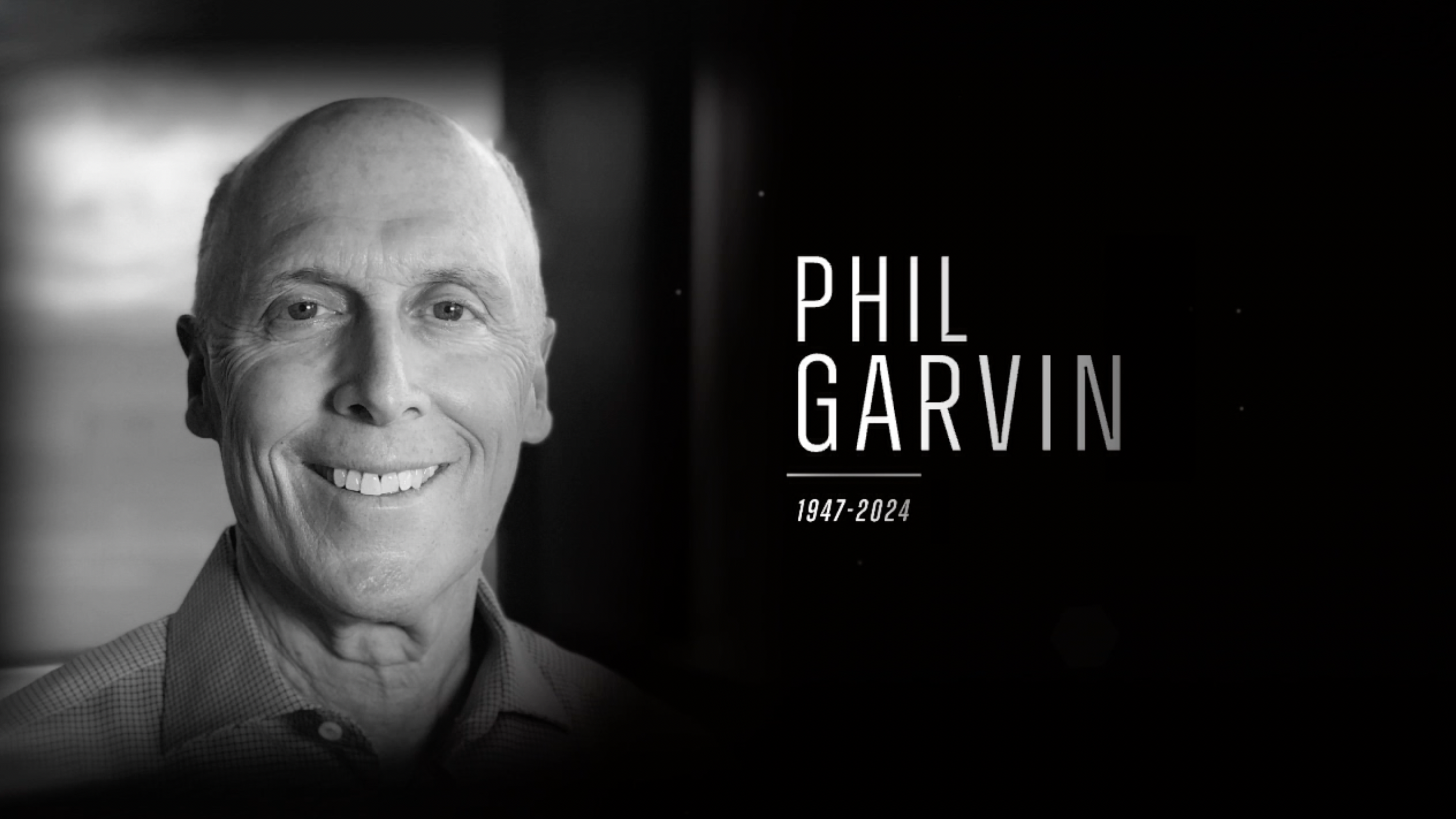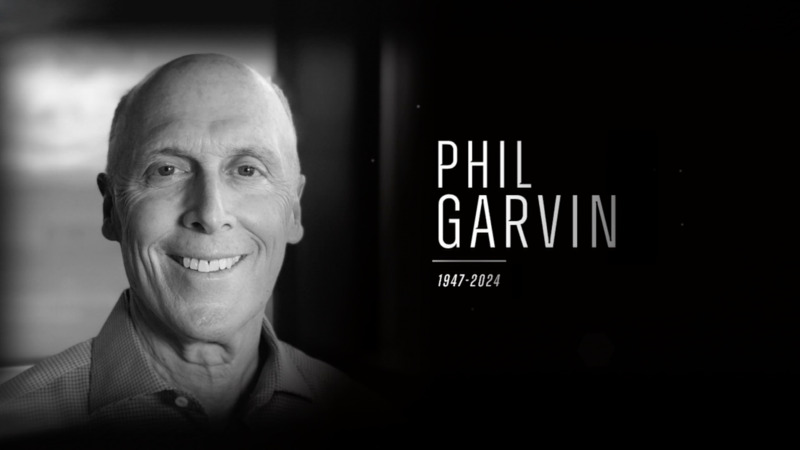Philip Roger Garvin, September 5, 2024
Note: Following our new protocol, this is an “in process” In Memoriam draft that shares early reports about Phil Garvin’s passing away. Below, we reprint the full story that appeared yesterday in Sport Video Group News. As we learn more, we will update the story and take off the “In Process” tag when done.

The only other recent mention of Phil online, as of today, is a story from June when he “stepped upstairs” to Chairman of his business, Mobile TV Group, and named his son Nick as CEO.
You may enjoy a story he told in his 50th Reunion Essay about how he got his start in film and production. My limited experience with Phil was that he could artfully create a great narrative. I only wish he’d shared a bit more.
There was a nice profile of Phil printed in his hometown Denver Post in 2016. He briefly touches on how he created a book in 1973 — “Religious America” — that later became a PBS series. In 1983, he became managing producer of the MacNeil/Lehrer NewsHour and moved to Denver to start its western production center. The profile covers later chapters in Phil’s like, like how he and Mark Cuban created HDNet.
Fox Tribute

Philip Garvin, Mobile TV Group Founder and Live-Production Titan, Dies at 76
Garvin was a leader and pioneer in the regional-sports-production community
Philip Garvin, the founder and former CEO of Mobile TV Group and a giant in the live-production industry for five decades, died on Thursday surrounded by his family in Colorado. Responsible for the production of hundreds of thousands of live sports, news, and entertainment events, Garvin helped to pioneer the HD revolution of the early 2000’s and is one of the most widely respected figures in the sports-video-production industry. Garvin was 76 years old.

“He left his mark on the industry and in our hearts. While nothing can ease the grief we all feel today, his memory will touch us all in the work we do every day,” says Garvin’s son and MTVG CEO Nick Garvin. “His legacy will endure through the incredible accomplishments of our team at MTVG.”
In addition to his leadership of MTVG, Garvin also served as president of Colorado Studios – an audio/video manufacturing facility specializing in building mobile units and supporting live video transport – and co–founded HDNet, the first all high-definition national television network in the U.S., with Mark Cuban in 2001.
“Philip was an amazing man. Smart. Honorable. And as hardworking as anyone ever,” shared Cuban.
Garvin built his businesses around his experience as a creative producer and technologist. By combining both skills, he was able to offer cost-effective production solutions that were unique in the industry. And he did it all while maintaining a reputation as a straight-shooter and trusted partner. His success grew in tandem with many loyal and equally talented industry partners, many with whom he worked with for over 40 years.
Born in New York City, Garvin was passionate about telling visual stories from an early age and pursued a career in still photography. A graduate of Yale University, Garvin published multiple photography books and produced several documentaries, including the groundbreaking docuseries Religious America for PBS in 1974. He continued to innovate throughout the 1970’s and launched Colorado Studios in 1978. He also continued his work for PBS, becoming managing producer of the MacNeil/Lehrer NewsHour in 1983 and spearheading the launch of PBS News’ western production center in Denver.
In the early 1990’s, Garvin saw an opportunity as regional sports networks began to proliferate across the U.S. and launched what would become Mobile TV Group in 1994. MTVG quickly became the foremost provider of mobile production facilities for regional sports networks throughout the country and pioneered the “dual feed” production model that would become commonplace across the industry.
Under Garvin’s leadership over the ensuing 30 years, MTVG would cement its status as a pillar of the live-sports-production business, rolling out dozens of mobile units and helping pave the way for the first-ever live HD sports broadcasts. MTVG also was among the first to launch 4K- and HDR-capable mobile units and introduced Cloud Control, the first fully remote production managed service, in response to the evolving industry.
Both inside and outside of his role with MTVG, Garvin was a champion of HD broadcasting and helped to bring HD content to the masses for the first time in the early 2000’s. He co-founded HDNet, the first HD national television network in the U.S., with Mark Cuban in 2001 and served as general manager of the cable network (which became AXS TV in 2012) for 12 years. Under Garvin’s stewardship, HDNet was among the first to distribute HD content to the home, including sporting events, concerts performances, and news coverage.
Today, Mobile TV Group produces more than 4,000 major live events each year, covering professional and collegiate sports, live music, entertainment, esports and business events. Garvin’s son Nick, took over as the company’s CEO in June, while Philip shifted into the role of Chairman of the Board.
Garvin was a pillar of the sports-production community, serving as a longtime member of the SVG Advisory Board and was a fixture at SVG conferences. He also served on the board for various technology startups and helped to champion a variety of industry technology initiatives.
Outside of the office, Garvin’s passion was spending time on his ranch with his wife, riding horses, mowing fields, and building fences. In his last months of life, he was frequently telling people, “no one has had a better life than mine.”
His family, wife Angela, children Jana, Leah and Nick, and three grandchildren celebrate him for all his valuable achievements, dedicated relationships and generous heart.
Please send any messages for the Garvin family to GarvinFamily@mobiletvgroup.com so no messages are missed or lost. Further details regarding memorial services will be available at a later date. Stay tuned to SVG for a deeper in memoriam piece next week.


Phil Garvin was one of those guys that made Yale a special and curious place for me. He was from an impressive New York City background of culture and accomplishment, while I was from modest circumstances in Upstate New York. Nevertheless, Phll and I would hang out together, and we had a kind of “antic” relationship, always infused with his kindness. Looking back, I think he might have found my cluelessness funny and charming.
Since I was active in music at Yale, and even ended up a History of Music major, the fact that Phil’s step father was the celebrated George London, an accomplished operatic bass-baritone, made our connection special. I would get opera and celebrity gossip from him, which in pre-internet days was cool. For that matter, Phil was just cool, that’s all.
As I moved through the twisted path of my life after Yale, I lost touch with him. We briefly reconnected several years ago through my next door neighbor who was one of Phil’s top competitors in the mobile video business. At the 50th I chatted with Phil, and we connected maybe once or twice more. It’s so hard to put all these fragments and memories in order. I never got to tell him what he meant to me…..
Though I knew Phil Garvin during my entire time at Yale (we were entryway-mates in Vanderbilt Hall our freshman year), my most vivid memory of him is from April of our junior year, when we went to the Greenwich Village apartment of the poet Stanley Kunitz (1905-2006), so Phil could take photos to accompany my interview with Kunitz in the May issue of the Yale Literary Magazine. What struck both Kunitz and me was the intense physical passion Phil threw into that photo session. After it was over, he collapsed in exhaustion on a couch and Stanley ran to get him a pitcher of water.
The resulting photos (eight, including the cover photo) were, in my opinion, the best ever taken of this superb poet. Kunitz himself evidently agreed, for he used one of those photos as the author photo for his book The Testing-Tree (1971). I was disappointed and indeed a bit shocked to see that Atlantic Little Brown used that photo without properly attributing it to Phil.
But wait! After writing the above, I visited the Wikipedia site on Kunitz, and guess what? It uses that same photo Phil took that day—and it, too, fails to give him credit for it. Here it is:
https://en.wikipedia.org/wiki/Stanley_Kunitz
David Lupher